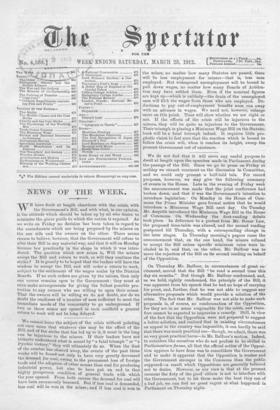On Thursday Mr. Balfour, in circumstances of great ex- citement,
moved that the Bill " be read a second time this day six months." But though Mr. Balfour condemned, and, as we hold, rightly condemned, the principle of the Bill, it was apparent from his speech that ho had no hope of carrying his point, and, further, that ho was not able to suggest any alternative proposals which would provide a solution of the crisis. The fact that Mr. Balfour was not able to make each proposals is, of course, no condemnation of the Opposition, for they are in no sense responsible for the orisie, and there- fore cannot be expected to improvise a remedy. Still, in view of the fact that the Opposition were not prepared to suggest a better solution, and realized that in existing circumstances an appeal to the country was impossible, it can hardly be said that there was much practical use—though, we admit, there was no very great practical harm—in Mr. Balfour's motion. Indeed, to outsiders like ourselves who do not profess to be skilled in Parliamentary finesse, all that the official action of the Opposi- tion appears to have done was to consolidate the Government and to make it apparent that the Opposition is weaker and the Government stronger in the Commons than the public supposed—a result which Oppositions are generally believed not to desire. However, as our view is that at the present moment the duty of the good citizen is not to interfere with the Government, but to let them make the best they can of a bad job, we can feel no great regret at what happened in






































